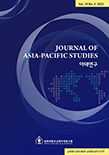중국의 과학적 발전관의 내용과 함의
China's 'Scientific concept of development' and its Implications
- 경희대학교 국제지역연구원
- 아태연구
- 제15권 제1호
-
2008.0573 - 89 (17 pages)
- 10

CCP's 17th party congress inserted HuJintao's concept of the 'scientific development' into the amendment of the party constitution. Scientific concept of development which focuses on a people-oriented, overall, coordinated and sustainable development of China, seems to substitute previous 'reform and open-door policy' as a new guide line of China's future economic development. After 30 years of successful transformation and accomplishing all the conditions which follows China's WTO accession in 2001, China became one of the most influential market economy in the global economy. Now China is facing a new, fundamentally different task, that is to choose a specific path of development its own market economy, which should reflect current social structure and balance among various interest groups. The scientific concept of development is to cope with this new task. However, given one-party system and lack of active civil society, it's very hard to get necessary signals from the society and to find proper balances among the groups. As a result, so called scientific concept of development might be followed by a more interventionist government, which is different from former reformist one. This kind of interventions should tend to collide with market. This will be a new challenge against the authority of CCP in the long run.
Ⅰ. 17차 당대회와 과학적 발전관
Ⅱ. 과학적 발전관의 등장과 주요 내용
Ⅲ. 개혁개방의 종결과 중국형 발전모델 모색
Ⅳ. 현실적 귀결:개혁에서 개입으로
Ⅴ. 전망:시장과의 충돌
참고문헌
(0)
(0)